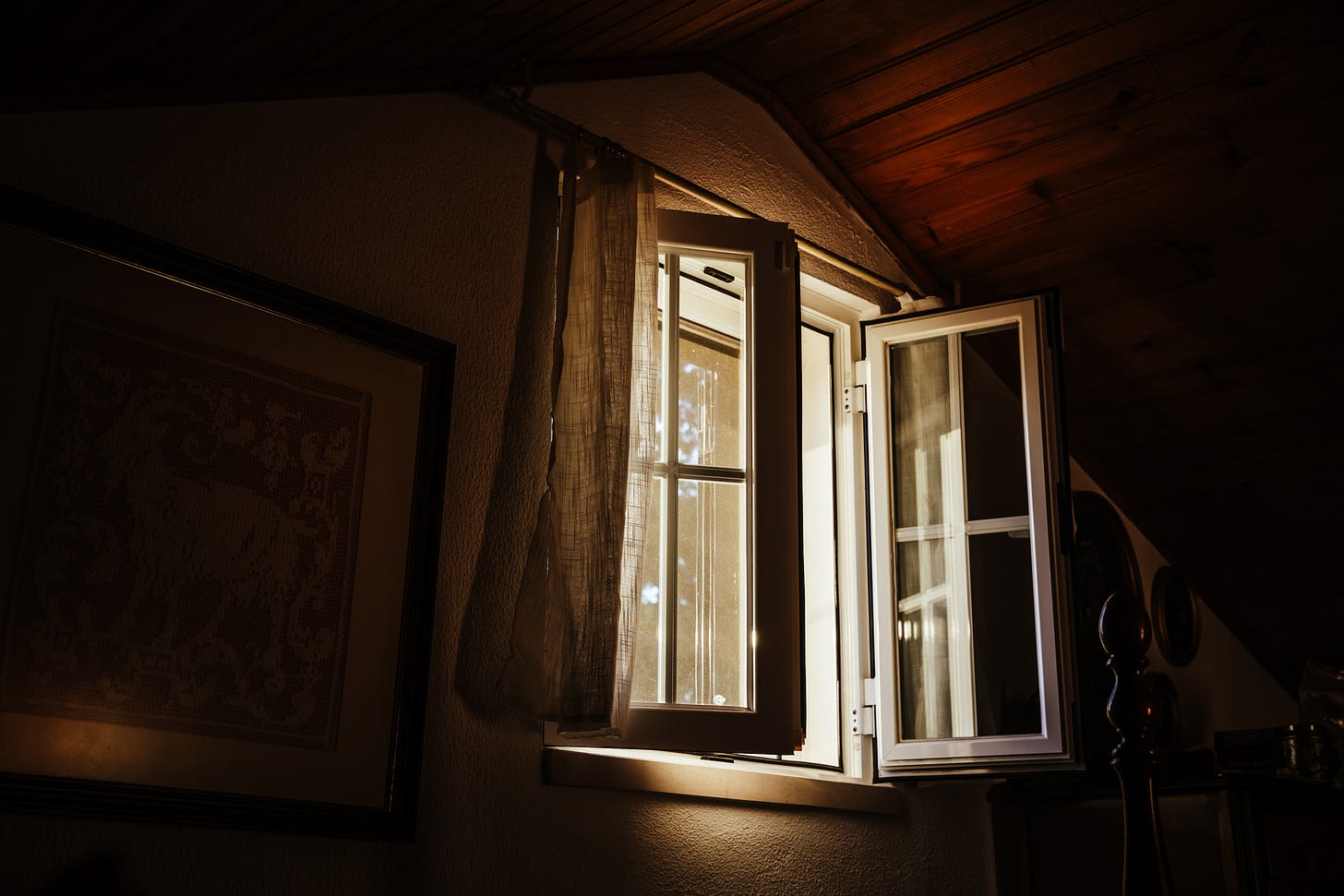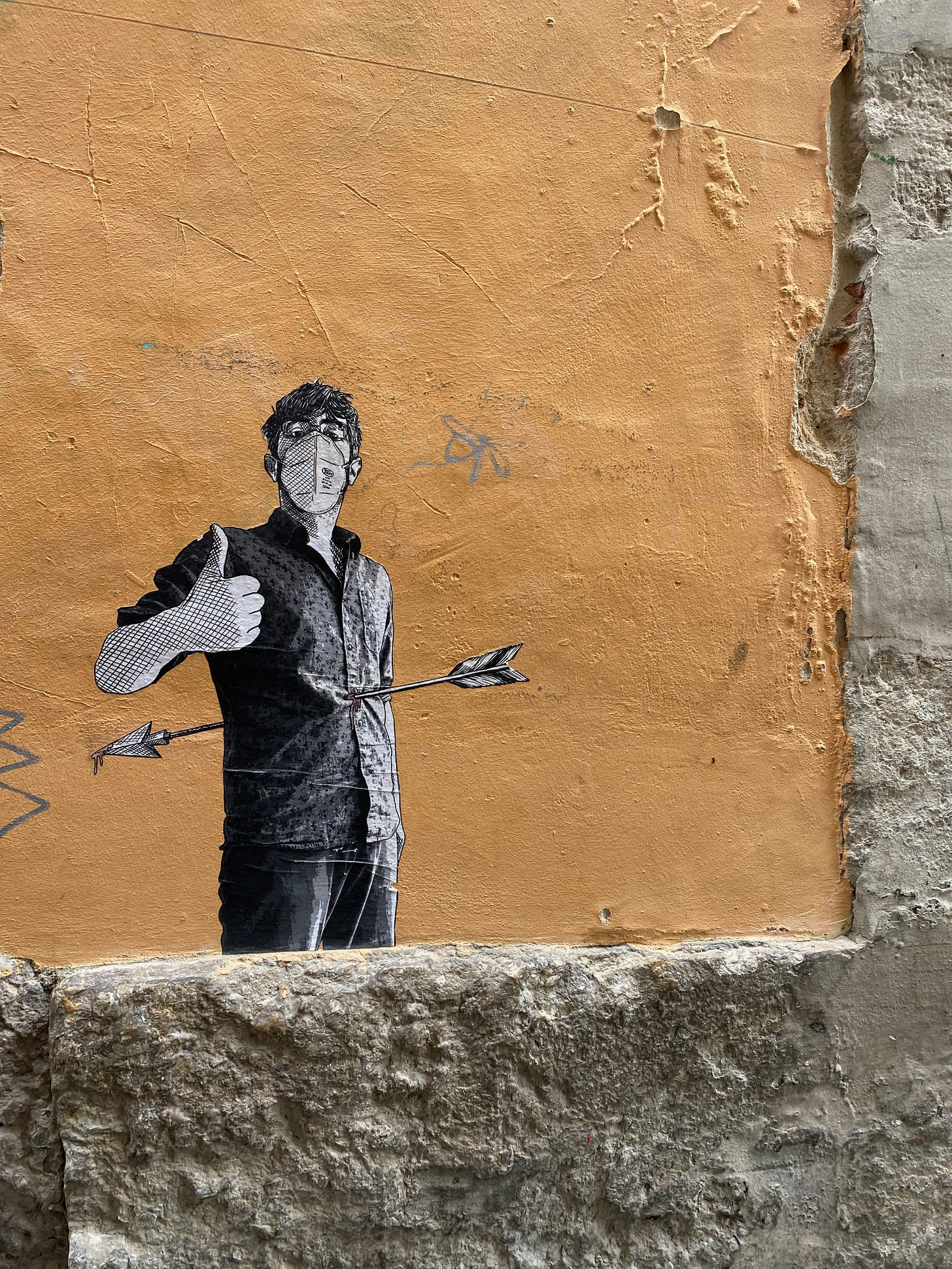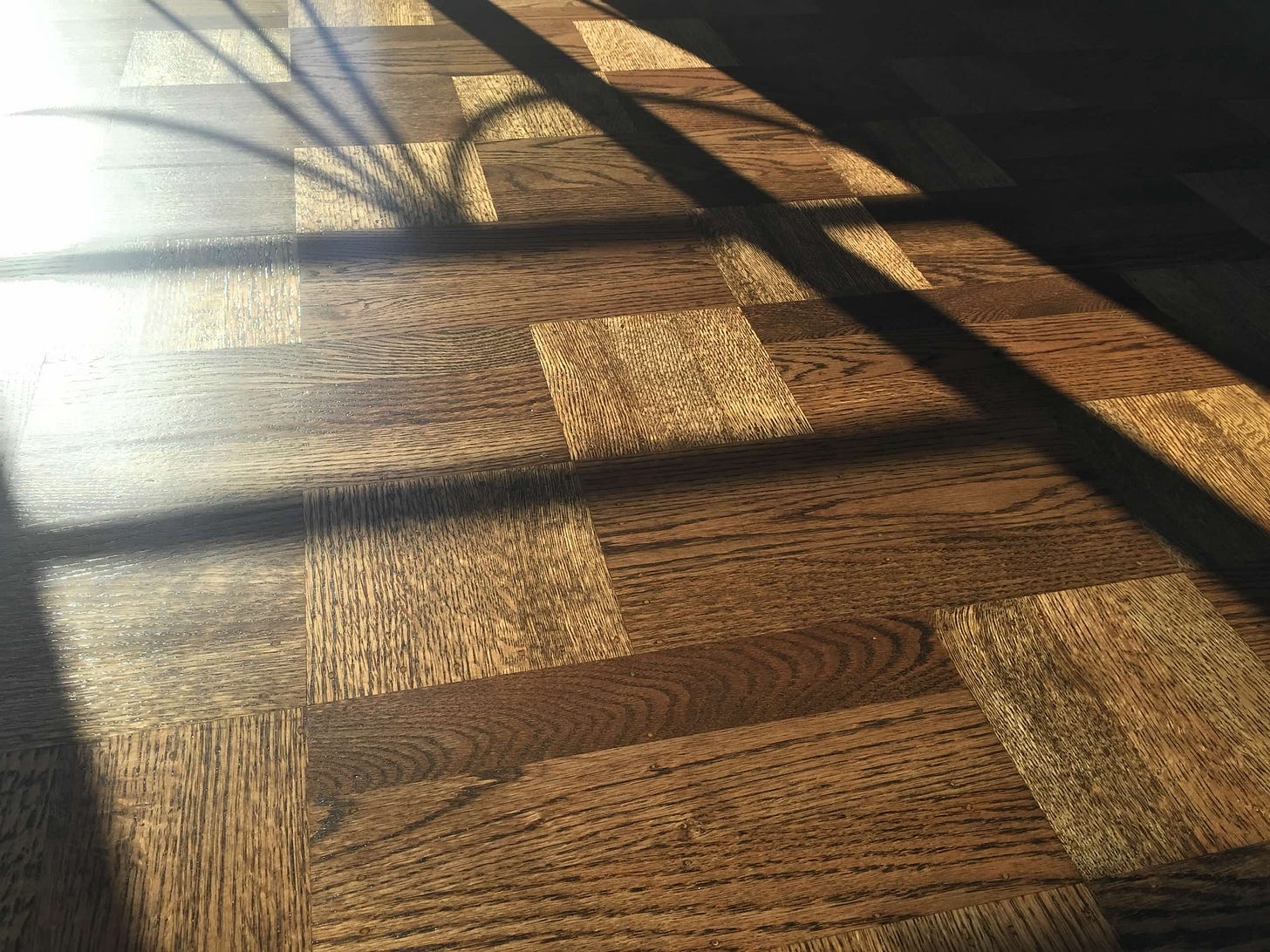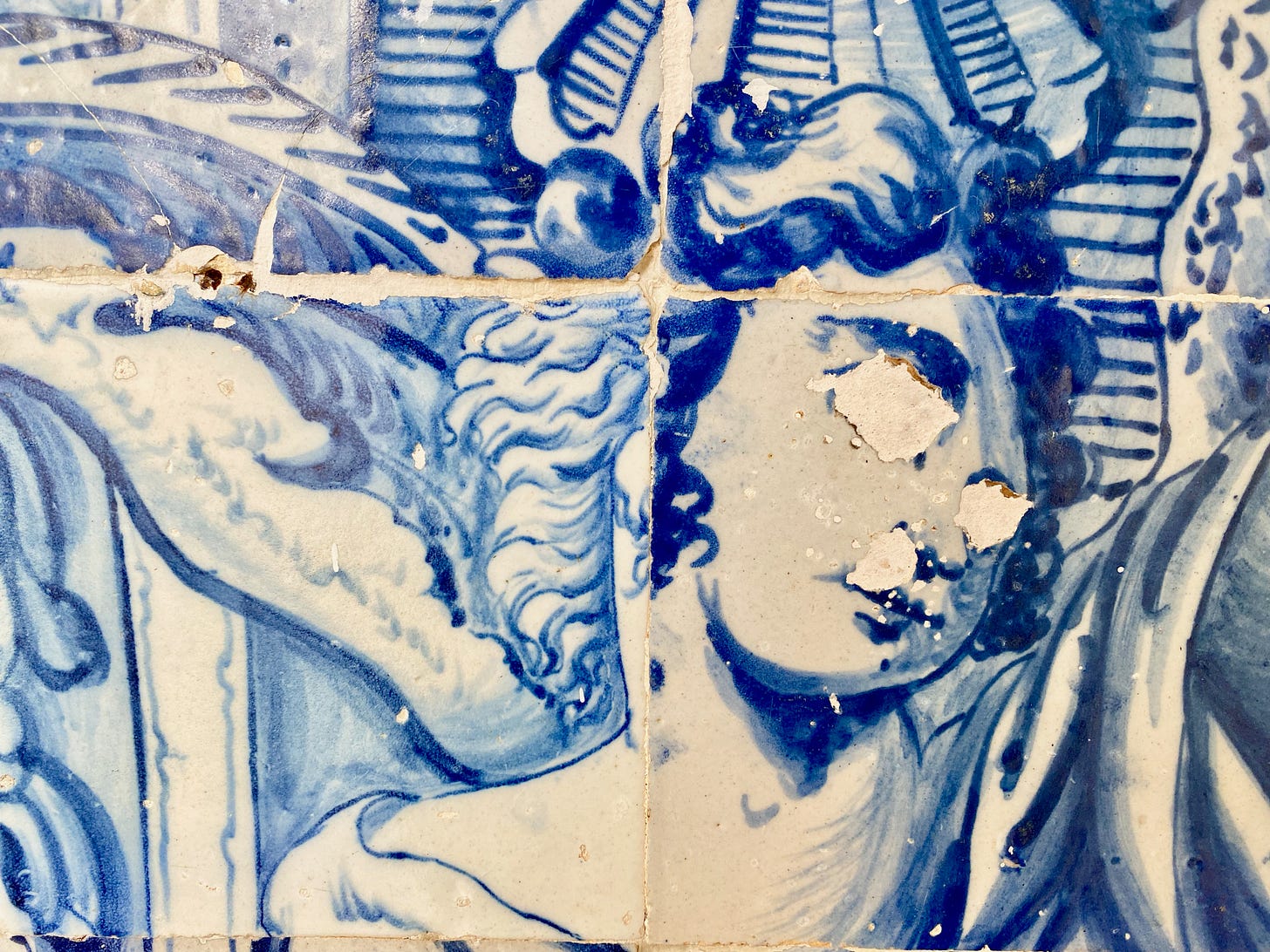
It’s my practice to only write in this space when I feel I have something real to say. Although I like to publish at least twice a month, I don’t believe in churning out word count just to fill space. Some months I have more to say that feels worth sharing, sometimes less.
I’ve noticed within the last few months that the things I find myself wanting to write about in this space are less related to the process or experience of relocating to and getting settled in Portugal and more about conversations that I’ve been having in my own head.
Part of this urge can be attributed to the fact that I’m starting to feel more settled. Life in Portugal is beginning to look more like regular old life and less like transition.
This week, two of our closest friends emigrated from Oakland, CA to Milan, Italy. We shared a flurry of in-the-moment WhatsApp messages during their final days in the US. Many of their texts were filled with absolute overwhelm in the midst of emotional goodbyes and the stress of fielding the multitude of things that demand attention when you’re leaving your homeland for good. “Oh yeah,” Marido and I said to each other as we texted back words of empathy and encouragement, “that’s what it felt like.”
We are 16 months past that initial exit/entry mayhem, and yet life as a transplant continues to affect the way I look at pretty much everything these days. While my Portuguese is (slowly) progressing and the how of daily life is less confusing, the awareness of not being from here is ever-present.
I find myself wondering if the things that run the loop in my mind in the deep dark of night would be different if I had never made the move. If I were still an American in America.
I think perhaps not. I think there are some things you only learn by leaving…
Part 1: Saudade at 3 a.m.
There is no direct English translation for the Portuguese word “saudade.” It is best approximated by terms like “bittersweet” or “longing.” But those words don’t encompass the full meaning, which is “a deep emotional state of nostalgic or profound melancholic longing for something or someone that one cares for, or loves. Saudade often carries a repressed knowledge that the object of longing might never be had again. It is the recollection of feelings, experiences, places, or events that once brought excitement, pleasure, and well-being, which now trigger the senses and make one experience the pain of separation from those joyous sensations.”
If I drink too much tea before bedtime, I wake at the witching hour and lie there staring at the shadows trying to convince myself that I don’t actually have to pee, that I’m going to fall asleep again in just a minute.
It never works.
Eventually I hoist myself from the cocoon of blankets and make my way down the hall to deal with the inevitable. Only seconds pass before I return to the still-warm hollow of my bed, but by then it’s too late. The light has flicked on in back corner of my brain where I shove my deep, dark thoughts.
The other night, I lay awake filled with longing for the feel and creak of the hardwood floors in my former San Francisco home on 46th Avenue. It’s not homesickness, per se. I don’t really want to go back.
But there is so much about the years we spent in that house that was a perfect encapsulation of all the reasons to love San Francisco. It is hard, still, to look at photos from that time without getting teary—especially the span of 2014-2019, which feels like the high-water mark of that season of life. It was full and joyous and light.
Filha and I talk about all the things we miss from our former life. Watching the sun sink into the Pacific at Ocean Beach. Taking Vila for a hike in the dunes at Fort Funston. The trails and trees and hawks and coyotes of Golden Gate Park. Green Apple Bookstore. Pad Se-Ew from Sri Thai on Lincoln. Gus’s Community Market. Morning light through the bedroom windows. The towering Monterey Cypress in our back yard. Our friends, our friends, our friends.
We know that even if we truly wanted to return, the life we remember with such fondness is gone. Many of those friends we miss so much have also left San Francisco. Our home, the hardwood floors, the cypress tree—they belong to someone else now. We have moved on, and so has San Francisco. Nothing would ever be quite the same as we remember it. Not even the Thai food.
And so we carry on, with saudade and with the knowledge that we are lucky to love and have been loved so deeply.
Part 2: Regret as an indicator of evolution

For much of my life, I bought into the idea that I shouldn’t have regrets because everything in life happens to teach us something, etc. ad nauseam. Upon examination, this rule seems very much connected to the religious perspective that God is in control of our lives and everything happens according to His Divine Plan.
I called bullshit on that celestial plan a long time ago, but am only now taking another look at regret.
I read something recently that reframed the concept by saying that regretting something means disagreeing with an action or decision we have previously made. Thus, in order to look back and recognize the error of our ways, we must evolve.
This transforms the narrative of regret from, “what a shitty person I am” into “look how far I have come.” Regrets can be a positive negative emotion.
I also tend to think of regret as wishing I hadn’t done something. But often the biggest regrets we have are about the things we could have done but didn’t. We didn’t take the chance, say the thing, make the move, buy the farmland. (That last one is my dad’s biggest regret, a long-lost acreage that he still drives past 60 years later and rues his youthful caution.)
One of the reasons I chose to have a baby was that I didn’t want to get too old to be a mother and then wish that I had.
One of the reasons we chose to move to Portugal when we did was that we didn’t want to wait too long, get too old, be too afraid, and then wish we had just worked up some courage.
This is one of the things I turn over in my head in the small hours, wondering if it’s ok to wear a shirt that says “I do not regret anything” when I do, in fact, have some regrets.
Perhaps the trick is to collect only small regrets, the kind that evidence that I have learned and grown.
When it all comes down, the goal is not a perfect record but a lifelong pursuit of betterment…
Better to have loved and lost.
Better to have tried and failed.
Better to go, to do, to say, to see,
than to stay silent/safe/static and wish you had written a different story.
Part 3: Parsing some American biases
Recently on a Facebook group for Americans living in or moving to Portugal, a comment thread devolved into an argument. Saying there was an argument in a comments section is like saying that ducks quack, I know.
Usually I swerve around the pileup. But this time I rubbernecked, and one of the comments struck me in such a way that I took a screenshot so I could think about it later. I’ve learned—or I am learning, because this is not a thing I’ve mastered—that if something makes me uncomfortable or defensive, I should pause and ask myself why.
Of course, it would be ideal if I would ask why in the bright light of day instead of the middle of the night when I’m trying not to pee, but this is your brain in your 40s.
The argument was about whether or not Americans (or American media) are responsible for a change (for the worse) in Portuguese culture. The comment that caught my attention made the point that this type of thinking is just another version of American exceptionalism. We are so big, so influential, so very star-spangled American that everything everywhere has to do with us.
The phrase the person used that really stuck with me was: “the soft bigotry of low expectations.”
Turns out this is a line that originated with George W. Bush (more accurately, with his head speechwriter Michael Gerson) back in 2000. Bush was giving a speech to the NAACP about racism in the classroom and the way teachers’ expectations are often based on racial bias.
There is an argument to be made that soft bigotry is just regular old bigotry, nothing really “soft” about it. It’s a nice turn of phrase though, which is why it caught my eye. I chewed on it for several days, thinking about how my own bigotry comes into play as an American living in Portugal, because that American narcissism really does get pounded into us from birth.
I was thinking about a Portuguese guy we know who often says really homophobic things. I was thinking about how I’ve told Marido that, “If he were an American and he said that, I would know exactly what to do with him.”
Meaning that I have lower expectations of this guy because he’s not as alert to racial prejudice and discrimination as I am.
When I frame this situation in response to the “soft bigotry of low expectations,” I would say that yes, my knee-jerk reaction is that I, a well-educated, well-traveled, fairly enlightened person am superior to this guy. I am smug about my shock at his homophobia. I wince and get all pearl-clutchy about the way he scoffs, “No, I don’t want any iced tea! What, do you think I’m gay???!”
It would serve me well to remember that I, too, was once homophobic. I grew up thinking that LGBTQ+ people were a literal abomination, an affront to all that was good and holy. Those patterns of thinking were things I came to regret, though, because my prejudices were challenged as my world got wider.
And sure, to change your mind you have to be open to growth. You have to be willing to be wrong. But on the flip side, you have to be willing to challenge someone. You have to be willing to say, “What did you mean by that?” or “Why would you say something like that?”
I think there is (yet another) bias at play here called the Fundamental Attribution Error, which says people tend to believe that what people do reflects who they are.
Meaning that if a driver cuts you off in traffic, you tend to assume that they’re aggressive, they’re a jerk, they’re a bad driver. You don’t consider that perhaps they’re an inexperienced driver, or they’ve just received terrible news and they’re distraught, or they’re rushing somewhere to deal with an emergency. Meaning that, in this situation, I pat myself on the back for being capable of growth and change and then turn around and assume that this guy isn’t open to growth. Maybe I tell myself a story about how he’s lacking in curiosity and character and worldly experience. Maybe I attribute his homophobia to a character flaw without taking into account his situation or context, like that he has perhaps lived in a very small bubble among very similar people who all think the very same things and he has not yet been challenged to see/think/speak differently.
I am still processing this situation and my own inherent bias, so I don’t yet have my thoughts lined up all coherent and eloquent yet. What I do know, though, is that living in another country and rebuilding your life from the ground up throws you into the company of people you would not have chosen to hang out with if you had remained safe and static in your old life.
When I told Marido, “If this guy were an American, I would know exactly what to do with him,” what I meant was: I wouldn’t hang out with him. It would be an instant Nope. I wouldn’t stay in the room long enough to challenge him, let alone call him a friend. And yes, that’s judgmental as heck.
So being the immigrant who doesn’t speak the language (well) and doesn’t know the culture (yet) is forcing me to take another look at the stories I tell myself about myself.
I still have a lot to learn. I still have room for improvement.
What a lucky thing it is then, that I am hale and whole and here and listening.
Even at 3 a.m.

*This post is dedicated to my friend Chris I., who lent me a gorgeous little writing nook in Lisbon this week.*








Wow. So well said, those little niggles about the who and why of being, brought forth by looking at it all through a new and different lens. I could never express those thoughts so concisely nor so eloquently, but I can, and have, felt them. We've been here a couple of years now, I think that we all, in our own way, have had our eyes/ears/minds opened for examination... thank you!
You always make me smile. Even with an "excavation of longing, regret, and prejudice ." As an enneagram four myself, I resounded with a great deal of what you said in this post. There is a sense of longing, not for the place or going back but for how things used to be. As fours, we, in particular, feel that; because we were made to. All enneagrams will feel it to some extent, but fours, well, we don't shy away from the deeper, scarier emotions. We poke at them, mull over them, argue with them, and question them for their authenticity. Living abroad and leaving the safe and the comfortable does not guarantee us a ticket to avoid that; if anything, at times, it makes that those emotions even more acute. I hope that even in the dark of night, you continue to poke, prod, mull over, and think through those emotions because somewhere, someday, someone will need your insight without going to the depths you did.